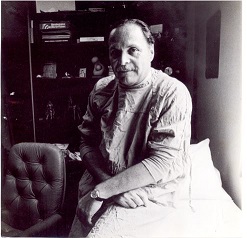Pediatric surgeon and co-founder, U.S. hospital ethics rounds
 Dr. Donald M. Buckner, a pediatric surgeon described by a colleague as having saved more babies than anyone in the history of civilization, died on July 21. He was 86.
Dr. Donald M. Buckner, a pediatric surgeon described by a colleague as having saved more babies than anyone in the history of civilization, died on July 21. He was 86.
Dr. Buckner practiced at the University of Miami/Jackson Memorial Hospital from 1973 until his retirement in 2014. In addition to 40 years of surgical practice, he was a pioneer in introducing medical ethics into teaching hospitals.
He contributed for the past 25 years to the UM Miller School of Medicine’s Institute for Bioethics and Health Policy, and served on the ethics committees at Jackson and University of Miami hospitals. He taught and mentored medical students and residents; his formal lectures addressed issues of professionalism in medicine. A voracious reader, he was known to read ethics and philosophy books between surgeries.
“Dr. Buckner’s reputation – his legacy – of commitment to the most vulnerable of patients is nothing less than extraordinary,” said Dr. Henri R. Ford, dean and chief academic officer of the Miller School of Medicine. “We will miss him as much as our community was lucky to have him.”
(Read more testimonials and condolences from UM and Jackson colleagues and friends here.)
Dr. Buckner was honored four times with UM’s George Paff Award for Teaching Excellence and thrice with the UM Housestaff Physicians Association’s Outstanding Teacher Award.
“I met Don on my first day as a pediatric intern nearly 30 years ago,” said Dr. Jeffrey Brosco, a professor of clinical pediatrics at UM, Associate Director of the Mailman Center for Child Development and chair of the Pediatric Bioethics Committee at Jackson’s Holtz Children’s Hospital, “and I never stopped learning from him: not just what he taught explicitly; it was the doctor—the person—he was every day with patients and colleagues.”
Dr. Buckner was a surgeon who was respected by nurses – no mean feat given traditional power disparities – and revered by many of the hundreds of surgeons he trained from around the world. One surgeon who worked under him in 1999 and 2000 wrote to him several years ago from Portugal: “Sometimes we don´t verbalize our appreciation for the people who made a difference in our lives. I just want him to know that he made a big one in mine.”
“Dr. B was more than a professor, colleague, mentor, teacher; he was a good friend,” said Dr. Stanley Marks, Senior Vice President and Chief Medical Officer for South Florida’s Memorial Healthcare System, who trained as a general surgery resident under Dr. Buckner at Jackson Memorial Hospital in the 1970s. “He was a man we could go to with personal issues as one does with a dad or big brother. He expected much from his residents, but he taught us how to care for our patients both as a surgeon and, more importantly, as a human being.”
Buckner operated on thousands of children; it would be nearly impossible to determine how many. When he introduced Dr. Buckner for lectures, Dr. Kenneth Goodman, director of UM’s bioethics institute, would try to signal the speaker’s reputation by saying “he has saved more babies than anyone in the history of civilization.” It is probably true.
Dr. Buckner was compassionate and profane, gentle and strong, and hilariously ribald. He held strong opinions, and shared them. On medical education: “If the criteria for getting into med school include that you’ve got a brain, why do we spend so much time trying to fry it?” On both his disdain for corporate efforts to promote pharmaceutical products and arguments that drug company gifts had no effect on physicians: “Right – and if I kick you in the [testicles], that won’t influence you either.”
In 1983, his interest in ethical issues raised by severely impaired newborns led him and Dr. Tomi Kushner, a philosopher, to begin weekly “ethics rounds” in the neonatal critical care unit at Jackson Memorial Hospital. It was apparently the first formal effort to integrate ethics into U.S. hospital practice.
“Once a week he rounded with his residents in the Pediatric ICU to discuss the ethical issues of each patient’s case -- to my knowledge, the first of its kind anywhere,” said Kushner, founding editor of the Cambridge Quarterly of Healthcare Ethics. “Don was always a warrior for the good, no matter how tough the fight,” she said.
Dr. Buckner’s surgical skills in rare and complex cases were legend, and he was called on for difficult cases around South Florida, where he had privileges at several hospitals. His dedication to patients entailed sacrifice that became legend: he worked very long hours and would frequently leave his family, in Palmetto Bay in south Miami-Dade County, to drive (in a General Motors Saturn) 20 miles to the downtown UM/Jackson campus for patients who had taken a turn for the worse. “This is the job. One does not become a physician or surgeon to protect a ‘lifestyle,’ ” he once said. “I think surgeons should be celibate and priests should marry.”
Indeed, he was happily married for 52 years to Marjean Buckner, a nurse and educator, who predeceased him by five months. They met at Children’s Hospital Los Angeles, where she opened the country’s first pediatric cardiology ICU and he was a Fellow in cardiovascular surgery. It was the same hospital where UM medical school Dean Henri Ford was senior vice president and chief of surgery before coming to UM more than a half-century later.
Dr. Buckner is survived by two sons, David and Michael, a daughter, Leigh, and grandchildren Julia, Catherine and Mackenzie..



 Dr. Donald M. Buckner, a pediatric surgeon described by a colleague as having
Dr. Donald M. Buckner, a pediatric surgeon described by a colleague as having 